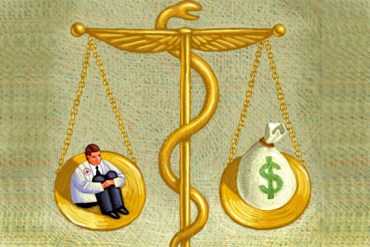Physician-owned hospitals are often vilified in America’s health care system, accused of siphoning the most profitable operations away from other hospitals while leaving them with the sicker and poorer patients. Congress has banned new ones from opening.
But an independent study released Wednesday argues physician-owned hospitals have gotten a bad rap. The study, published online by the British medical journal, The BMJ, concluded that overall, physician-owned hospitals are not cherry-picking patients or limiting themselves to the most lucrative types of procedures and operations.
 Some of these hospitals specialized in a narrow set of procedures, but they treated only 20 percent of patients who went to physician-owned hospitals, the study found. The rest sought care at doctor-owned hospitals that offered a range of services similar to those at community hospitals.
Some of these hospitals specialized in a narrow set of procedures, but they treated only 20 percent of patients who went to physician-owned hospitals, the study found. The rest sought care at doctor-owned hospitals that offered a range of services similar to those at community hospitals.
“By and large, physician-owned hospitals have virtually identical proportions of Medicaid patients and racial minorities and perform very similar to other hospitals in terms of quality of care,” said Dr. Daniel Blumenthal, the lead author and a clinical fellow at Massachusetts General Hospital.
The 2010 federal health care law not only banned new doctor-owned hospitals but also limited growth of existing ones. Legislation introduced in May in Congress that proposes to lift these restrictions is opposed by the main industry group, the American Hospital Association (AHA).
The study disputes more than a decade of previous research into the topic. In 2005, Congress’s independent Medicare Payment Advisory Commission, or MedPAC, examined 48 specialty physician-owned hospitals and found evidence that they took the easier and better paying cases. The inspector general of the Department of Health and Human Services reported in 2008 that specialty hospitals owned by doctors often lacked emergency rooms and around-the-clock staff who could respond to medical emergencies. Hospitals with emergency rooms tend to take care of more low-income patients and people with chronic ailments, like heart failure, which aren’t as profitable as elective surgeries.
Thomas Nickels, an executive at the hospital association, called the BMJ study “incomplete and somewhat flawed.” He noted that the researchers had not examined whether physicians were more likely to refer patients to their own hospitals. Such self-referrals are one of the main reasons the AHA has cited in asking Congress to retain the health law’s restrictions.
“They refer patients to their hospital that they want and they don’t take others,” Nickels said. “These institutions are enormously profitable, and they’re profitable because they’re choosing what kind of patients to take.”
But the new study concludes it was a mistake to judge physician-owned hospitals by just looking at those that specialize in narrow types of services. Of the doctor-owned hospitals the researchers identified from data provided by the Physician Hospitals of America, a trade group, 99 were specialty hospitals, but the majority, 120, were general acute hospitals. Those hospitals had sicker patients and more low-income and minority patients than did the specialty hospitals, even though both types were owned by doctors. Together, patients at physician-owned hospitals were slightly healthier than those at hospitals doctors did not own, but patients had similar death rates and faced the same numbers of chronic diseases.
“Overall, the differences, if they exist at all, are tiny,” said Dr. Ashish Jha, the study’s senior author and a professor at the Harvard School of Public Health. “There are much bigger differences between public hospitals and nonprofit hospitals, but we don’t go around banning all nonprofit hospitals.”
The study found that 6 percent of Medicare hospital admissions in the areas studied were at doctor-owned hospitals, suggesting that those facilities are not having a “meaningful impact” on the finances of other hospitals. “Our work suggests that some of the major criticisms of [physician-owned hospitals], including that they select more profitable patients, provide lower value care, and threaten the financial viability of surrounding hospitals, may no longer be valid,” the study said.
Dr. R. Blake Curd, president of Physician Hospitals of America, applauded the study, saying it backs up what they have been arguing for years. “This is a great look at the physician-owned hospital industry as a whole,” said Curd, a hand surgeon in South Dakota. “You can’t paint us with one broad brush stroke, which is what the American Hospital Association is always trying to do.”
The legislation to lift the ban on new physician-owned hospitals is in the House, but Nickels said no companion bill has been introduced in the Senate. “There seems to be very little interest in the Senate to pursue it,” he said.
But Curd said he expected a Senate bill would be introduced and said lawmakers were receptive. “It’s fine for Congress to reevaluate the policy decision they made in 2010,” he said.






